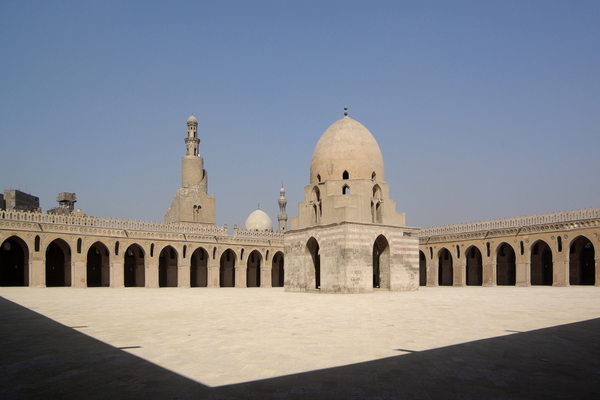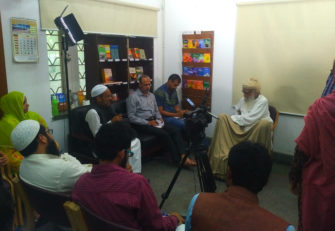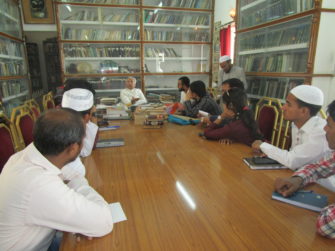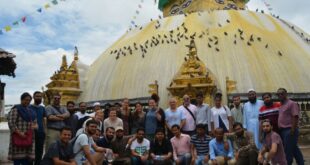
A week-long engagement from 5 to 11 April, 2017 of students of the online research-oriented program “Advancing scientific and theological literacy in madrasa discourses”, part of the Contending Modernities and the Institute of Religious and Social Thought was aptly summarised by participating students as “a welcome step to understanding some of the widely debated but intellectually complicated topics”.
The programme began at Don Bosco Provincial School, Jamia Nagar, New Delhi with 15 out of 17 Indian students enrolled for it early this year. It was simultaneously started with a batch of students from Pakistan at Lahore’s Sharia Academy. The week-long intensive programme was jointly conducted by a lead faculty of Kroc Institute for International Peace Studies of the University of Notre Dame, Mahan Mirza, Indian faculty Dr Waris Mazhari and Pakistani faculty Ammar K. Nasr.
Important classical texts of Ibn Khaldun, Imam Ghazali, Shah Waliullah and others were discussed apart from discussions held on the origin and history of philosophy against the backdrop of Jostein Gaarder’s famous work of fiction, “Sophie’s World”.
The discussion, as described by a participant, helped remove some of the misconceptions and brought clarity in understanding various important arguments regarding science, religion, God, philosophy, historiography, etc. The participant viewed that had it not been for the course, he might not have even read Ibn Khaldun, Marshal Hodgson, R. G. Collingwood, Robert Burns or such short but important pieces like “The disciplinary vocabulary of modernity” of Robert Orsi. Another participant described the course as “a significant breakthrough in learning”. He said that while teachers tried to feed knowledge of something which the student wasn’t receptive to, the approach of philosophical learning was student-led in which the philosopher brought out the knowledge from the learner by helping him question his own knowledge and understanding. “Now I have learnt to question my own knowledge as to why something is the way it is.”
The programme included meeting and interacting with intellectuals and area specialists besides a field trip to Aligarh. Before leaving for Aligarh on Saturday, 8 April, the Indian delegate met renowned Islamic scholar and author Maulana Wahiduddin Khan at the Centre for Peace & Spirituality located at Basti Hazrat Nizamuddin Auliya, New Delhi. During the interaction that lasted about two hours, the participants asked the nonagenarian scholar many questions related to Islamic history, philosophy as well as about theories and theological arguments. The Maualna offered answers to most questions and also referred to some of his important works that dealt with some questions raised during the interaction. He was against the idea of mixing madrasa syllabus with contemporary science subjects and technological topics maintaining that education of any discipline demanded ‘continuity’ and any major change in the syllabus of madrasas would amount to breaking that continuity.
Wahidduddin Khan asked all those present to be modest informing that “Modesty is the beginning of knowledge”. He refused to accept that there was crisis among Muslims. Instead of crisis there is “lack of openness” among Muslims, said he.

Prof Altaf Ahmad Azmi dwelt on some of the key issues and debates about ‘Ilm al-Kalam (scholastic philosophy). He talked about the nomenclature and objectives of ‘Ilm al-kalam stating that since both mantiq and falsafah or logic and philosophy were used as synonyms, both were referred to as ‘Ilm al-kalam. While talking about the topic he said that ‘Ilm al-kalam dealt with religious theories and thus the first ‘Ilm al-kalam in that sense was one that was begun by Imam Ghazali at a time when Aristotle was understood to be undisputedly the greatest philosopher. Ghazali provided a counter-narrative to the Greek philosophy which also encouraged other Muslim thinkers to write.
In Aligarh the delegation met and had a brief interaction with Hakim Syed Zillur Rahman who has established the beautiful Ibn Sina Academy of Medieval Medicine & Sciences. The Academy has a large collection of books and manuscripts on some of the most significant early classical works on medicine, history, poetry and philosophy. There are about 25000 books in the library on a range of topics from science to poetry, to law and literature. It has a rich section on poets Ghalib, Iqbal and others besides having a separate corner of works either by or on Sir Syed Khan, the great Muslim reformer and founder of Aligarh Muslim University.
However, the charm of the Academy is the collection of arts and artefacts housed inside the beautiful museum annexed to the library. According to Padma Shri Hakim Zillur Rahman, the idea behind establishment of the library and the museum is to “preserve the history and legacy of great minds” like that of Ibn Sina whose contribution to the discipline of medicine is huge but about which the new generation has either no or least knowledge. We have not produced a greater scientist than Ibn Sina in the last 1600 years, he said. For any community “it takes six generations to create a good legacy”. To do that, education comes first, then wealth and, then culture and civilization.

On the same Sunday 9 April, Yasin Mazhar Siddiqui began his interaction with the young scholars after he was asked to shed some light on the psychological aspect of the life of Prophet Muhammad. According to Siddiqui, Prophet Muhammad would suggest different things to different people at different times because of his great psychological insight and knowledge of the people’s temperament and their cultural contexts.
He said that many of the Prophet’s teachings were misconstrued for failure on the part of some scholars to understand the context in which the Prophet had ordered a particular thing. Therefore, “the most important thing to understand about any hadith is to understanding its undercurrents”. He said that there was need for rethinking and renewal of many Islamic disciples which were creating confusion just because they were being understood out of their contexts.
There is also need for understanding the cultural and geographic contexts in which the Prophet said things. For example, if you see, you will find that the Makkans had a proclivity for fighting. They were also very strong, but at the same time they had great memory and possessed better creative faculties whereas the people of Madina were soft-hearted, soft-spoken and, they had good relations with women. “We confuse many things with Islam whereas they are part of the culture”, Siddiqui said.
On the penultimate day of the intensive programme, Prof. A.K. Ramakrishnan of Jawaharlal Nehru University talked about the “Philosophy of History” with his “Reflections on Muslim Thinkers”.
Ramakrishnan talked about two traditions: Historical tradition where people from different times and places commented on similar kind of ideas and, the analytical tradition which is closely knit and where thinkers from different times, different contexts and continents talk differently about issues.
Reflecting on previous thinkers and generating new knowledge goes on with certain scholars, Ramakrishnan said adding that what we find in Islam are different scholars closely linked, producing new knowledge. Al-Farabi and al-Ghazali for instance reflected on important themes.
History is not a kind of traditional science. It is more of a social enterprise where individuals are involved. Therefore many people would be writing from different standpoints. The way they connect themselves to the work, there is a kind of individuality, a kind of uniqueness and persona that one is trying to understand. With such practices certain common themes emerge, he said. There is a personal factor but at the same time some generalizations are made by connecting them. History is also kind of a particular kind of history, particular events i.e. the biography.
Where one is talking about the history of ideas produced by scholars, one is talking of the “constitutive kind of knowledge making”. It is about organic intellectualism as the famous Italian thinker Antonia Gramsci used to say. These intellectuals have brought new knowledge through active and deeper engagements.
Thus, one way of approaching the history of philosophy and thought would be not to de-link the personality and the philosopher from his thought. Therefore, there is need for us to look back, said the Professor. He further said that there are certain areas of knowledge that we have to understand like the idea of renewal that is thinking about renewal.
The notions of tradition and modernity are now placed for debate as a major point of debate as if there is a kind of war between tradition and modernity in our thinking. What Islamic analytical approach has brought us is this linkage between the tradition and modernity. It is turath or heritage and tajdeed or renewal.
The former chairperson of Centre for West Asian Studies, JNU, Prof Ramakrishnan said that the word tajdeed is sometimes taken for renewal but the important point to remember in this is that this meaning is taken from the word of the Prophet. Thus, tradition itself talks about renewal. Sometimes tajdeed is taken in a religious kind of renewal, a particular textual context, sometimes as reform or islah. However, both are important aspects as part of socio-religious tradition. This is utilized where one is asserting the question of reason, a major vehicle for contemporary reason.
The idea of history and history writing in the current situation is related to the idea of national history. “We are almost in a prison house of the nation state”, said Prof Ramakrishna, who is also Director of the Human Rights Studies Programme at JNU. One needs to take into consideration the larger cosmopolitan connections across different countries and continents, a tradition that goes back to Islamic tradition. Modern disciplines of knowledge and modern nation states have almost similar kind of growth trajectory which is not the case of the analytical tradition which has come from different Islamic scholarships that we are talking about.
What we can learn from the early Muslim scholarship is the practice of connection. It is like the interdisciplinary tradition that we are turning to now. So we study them as a matter of connecting and moving beyond the way history is written in the modern world, Ramakrishnan concluded.
Maulana Zahid ur Rashi’s lecture on science and Islam was useful as it elaborated that there was no conflict between science and Islam, rather they were contributing to each other. While science dealt with ‘what’, religion tried to understand ‘why’ of the things. And the final objective of both was to ‘reach the truth’, he said.
Dr Waris Mazhari talked about Imam Ghazali’s approach to knowledge and its division between Shara’i and non-Shara’i each having further offshoots. Maulana Ammar Nasr presented a critique of Ibn Khaldun’s theory and practice of historiography. Mahan Mirza moderated most of the sessions with two separate sessions focusing on Sophie’s World.
On the final day of the programme, students shared their views and also came up with some suggestions for making it more useful. These among other things included: more focus on texts of other writers besides Ibn Khaldun, including some contemporary history books like that of Paul Kennedy’s “The Rise and Fall of the Great Powers”, and dividing the three-year programme on in three levels each being for one year as Certificate, Diploma and Advanced Diploma or Level 1, Level 2 and Level 3 and/or Advanced Level.
 IRST Institute of Religious & Social Thoughts
IRST Institute of Religious & Social Thoughts
